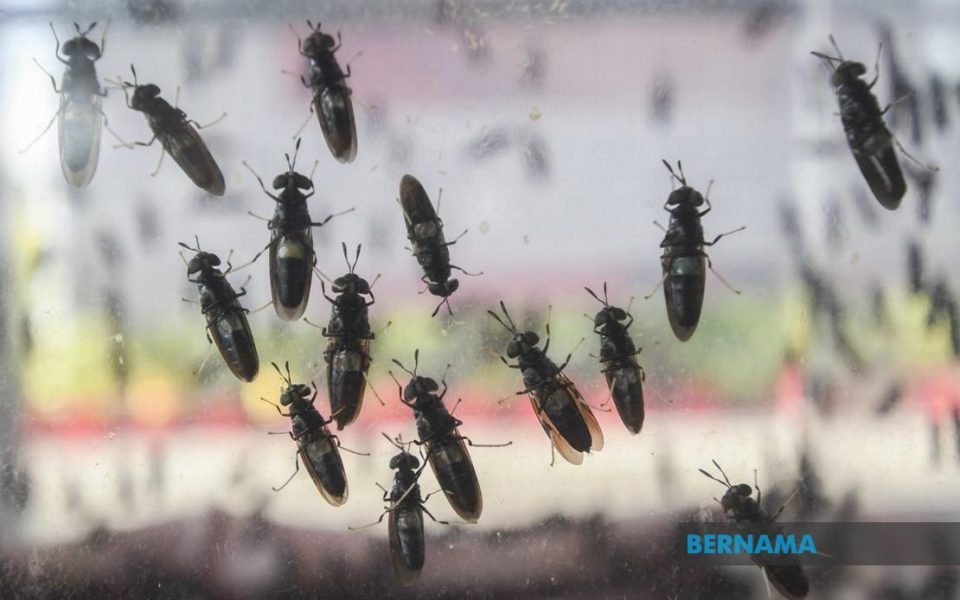KUALA LUMPUR, July 25 — Rearing flies may not sound like an exciting proposition but the larvae of the black soldier fly (BSF) species are known for their high protein content and have enormous potential to be utilised as an alternative animal feed, particularly for fish and poultry.
Malaysia is, currently, overly dependent on imported animal feed. With prices of goods, including animal feed, on the rise globally, the price of a 50-kilogramme bag of chicken bran has shot up to RM102 from RM85 in October last year, according to media reports.
In view of the rising costs, there is a pressing need to exploit alternative animal feed sources including the larvae of BSF, the scientific name of which is Hermetia illucens.
Senior lecturer at the Institute of Biological Sciences at Universiti Malaya’s (UM) Faculty of Science Dr Norhidayah Mohd Taufek said a report released by the United Nations in 2013 had identified insects as a good source of protein for livestock and poultry.
“It may seem peculiar to breed insects especially flies but based on studies carried out with industry players, the production of BSF larvae (as animal feed) can reduce the cost of buying animal feed such as bran,” she told Bernama.
Interestingly, as she pointed out, each gram of BSF eggs costing around RM10 is capable of yielding three to four kilogrammes of maggots that can be processed into animal feed.
Research
Norhidayah heads a team of researchers at UM that has, since last year, been actively researching locally available alternative protein sources to reduce the nation’s reliance on imported animal feed such as corn and soy.
She is confident that large-scale farming of BSF larvae can help to stabilise animal feed prices considering that their prices are far more competitive than that of imported animal feed.
“If chicken farmers breed their own BSF larvae and replace 30 to 40 per cent of the usual (imported) chicken feed with the larvae, their costs will definitely come down,” she said.
Apart from animal feed, BSF maggots can also be used for the management of organic waste as well as in the pharmaceutical, biodiesel and even cosmetic industries, she added.
Easy to breed
The black soldier fly has a short life span of 45 days; the adult insects start laying eggs when they are between 30 and 35 days old while the larvae can be harvested 15 to 18 days after they hatch.
Flies of this species can be found all over the world and they reproduce easily in hot weather, which makes Malaysia suitable for BSF farming.
“They are easy to breed… just place about one gram of BSF larvae in a basin together with some food leftovers and cover it with a mosquito net. Then, let it grow to the prepupal stage when it is about one-inch (2.54 cm) long,” explained Norhidayah, adding that BSF larvae are now easily available including via e-commerce platforms.
She said the maggots can be fed directly to the chickens or processed into high-protein pellets. To serve as fish feed, the larvae need to be processed into flour which is then blended with the pellet mixture.
BSF larvae also play a useful role in breaking down organic waste for the formation of compost, she said, adding that the Netherlands is among the nations that practice BSF farming widely.
The UM researchers, meanwhile, are currently collaborating with a marine fish breeding centre, operated by Ain Aquaculture Sdn Bhd and based in Kampung Gajah in Pengkalan Chepa, Kelantan, to expose the local communities including the Orang Asli to BSF larvae farming.
Ain Aquaculture manager Mohamad Akib Baharom said since the start of the project in 2020, many people have been taught to breed BSF larvae for the purpose of utilising them as fish feed.
Potential for development
“Many of those involved in this project are from the Orang Asli community and they have been enjoying its positive returns,” he said when contacted by Bernama.
He said to get the project going, their initial costs involved buying BSF eggs and spending about RM10,000 to complete the facilities already available at the project site.
They are also collaborating with a group of entrepreneurs involved in the Malaysian Islamic Youth Movement Kelantan’s outreach programme to develop a BSF larvae breeding facility at an abandoned cowshed in Kok Lanas, Kelantan, that has already been renovated.
Mohamad Akib said besides using the larvae as fish feed, BSF farms can also generate healthy income streams from egg and larvae sales as well as the production of organic fertilisers.
Norhidayah, meanwhile, said efforts to expand BSF farming must be stepped up by increasing research and upgrading BSF production facilities through the use of automation technology.
She said although Malaysia’s climate is conducive to BSF breeding, not many people are involved in this industry despite the good demand for high-protein animal feed in domestic and foreign markets.
“A large number of BSF breeders in Malaysia comprise foreign companies that export the larvae to countries in Europe because of the higher prices over there,” she said, adding that the local BSF breeding industry has yet to be regulated despite the high demand for the larvae in Malaysia.
“If we can increase domestic production (of BSF larvae) and get more entrepreneurs involved in this industry, it will result in more competitive pricing which will benefit all those concerned.”
— Bernama





